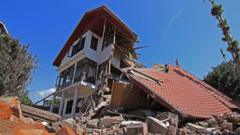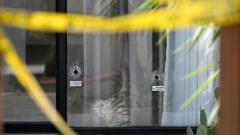In the wake of a deadly assault on tourists in Kashmir, Indian officials have taken aggressive actions including demolishing homes of alleged militants. With rising tensions between India and Pakistan, debates ensue over the implications of such measures and the need for distinguishing between militants and innocent civilians.
Escalating Tensions in Kashmir After Deadly Attack: India's Response Underscores Conflict Complexities

Escalating Tensions in Kashmir After Deadly Attack: India's Response Underscores Conflict Complexities
Following a tragic attack in Kashmir that left 26 dead, Indian authorities intensify measures against alleged militants, raising concerns over civilian safety and escalating tensions with Pakistan.
Authorities in Indian-administered Kashmir are taking drastic steps following last week’s deadly shooting that claimed the lives of 26 individuals, as Indian security forces demolish the houses of at least 10 alleged militants linked to the attack. Explosives were used to destroy properties since the assault occurred, primarily targeting homes associated with families of militants known to operate in the region or those who may have crossed into Pakistan.
The deadly incident near the popular tourist area of Pahalgam marks the worst attack on civilians in over two decades, triggering a fierce response from the Indian government, which has yet to formally name any insurgent groups responsible for the violence despite blaming Pakistan for harboring militants. In contrast, Islamabad denies these accusations.
As part of the crackdown, Indian authorities have detained over 1,500 individuals for questioning in a series of extensive operations, with further detentions reported. However, the government has faced backlash. Leaders in the region, including Jammu and Kashmir Chief Minister Omar Abdullah, have voiced concerns over the collateral damage incurred by demolishing homes of suspects, emphasizing the need to prevent innocent civilians from suffering consequences. Former chief minister Mehbooba Mufti reinforced this stance, calling on the government to differentiate between terrorists and non-combatants.
Notably, India's Supreme Court previously banned the controversial practice known as “bulldozer justice,” which has been on the rise in recent years. In addition to the demolition of homes, Kashmiri students attending schools in other Indian regions have reported being threatened or attacked following the incident.
Furthermore, as tensions simmer, Indian police have identified three suspects involved in the Pahalgam attack—two of whom are reportedly from Pakistan and one a local individual from Kashmir. The attackers appear to have targeted Hindu men specifically, causing an outpouring of grief and outrage across India, prompting Prime Minister Narendra Modi to vow relentless pursuit of justice for the victims.
The aftermath of the attack has seen strained relations between the two nuclear-armed neighbors escalate further. India has suspended commitments under the Indus Waters Treaty and has suggested that any water diversion would be viewed by Pakistan as an act of war. In retaliation, Pakistan suspended a longstanding agreement to amicably address disputes.
The border has seen increased military activity, with claims from India of intermittent gunfire from Pakistan. As conversations intensify, Western leaders like those from the U.S. and UK have urged both countries to approach a resolution responsibly. Modi reiterated his commitment to restoring peace in the region, stating that the attack was a direct attempt to disrupt the stability that Kashmir had begun to regain.






















